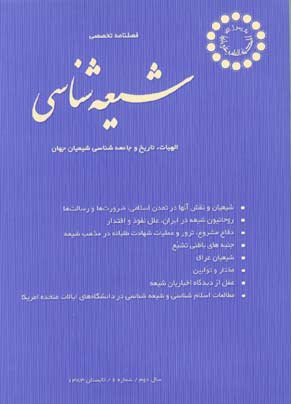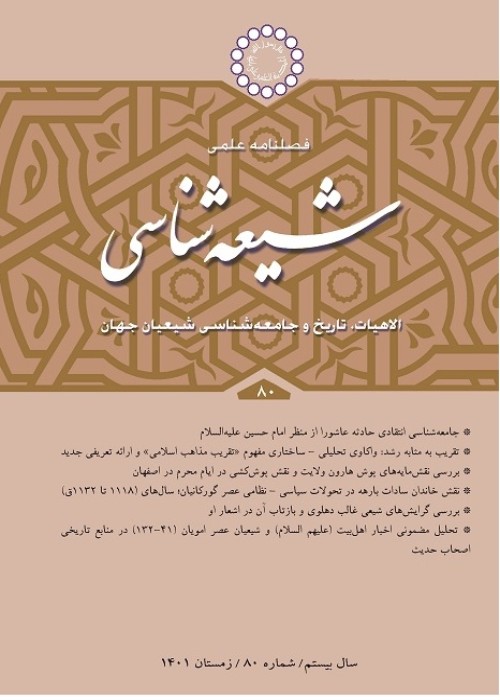فهرست مطالب

فصلنامه شیعه شناسی
پیاپی 6 (تابستان 1383)
- 260 صفحه، بهای روی جلد: 7,500ريال
- تاریخ انتشار: 1383/05/15
- تعداد عناوین: 13
-
صفحه 3
- مصاحبه
-
صفحه 7نگارنده کتاب پویایی فرهنگ و تمدن اسلام و ایران معتقد است: تفاضل آنچه مسلمانان در قرن های دوم و سوم هجری از غرب گرفتند با آنچه پس از قرون وسطا تحویل دادند، آن قدر زیاد است که می توان از تمدن اسلامی نام برد. شیعیان در این تمدن سهم مهمی داشتند. محتوای کتاب های اعیان الشیعه مرحوم سید محسن امین، الذریعه الی تصانیف الشیعه مرحوم حاج آقا بزرگ تهرانی، مجالس المومنین مرحوم قاضی نورالله شوشتری و تاسیس الشیعه لعلوم الاسلام مرحوم سید حسن صدر نمایانگر نقش شیعیان در تمدن اسلامی هستند.
- مقالات
-
صفحه 23این مقاله با بررسی جریان فکری اخباریگری، به ویژگی ها و فراز و فرود این جریان پرداخته است و عقل ستیزی را مهم ترین ویژگی این جریان می داند. در این مقاله، جایگاه عقل در این اندیشه مورد نقد و بررسی قرارگرفته است.
-
صفحه 59در این مقاله، سعی شده است بدون جانب داری از هر دیدگاه خاصی، به قیام مختار از دریچه تعاملات آن با دیگر حرکت های سیاسی معاصر خود نگریسته شود. از مهم ترین حرکت های سیاسی معاصر با مختار، حرکت شیعی توابین می باشد. نگارنده با مفروض گرفتن ماهیت شیعی قیام مختار سعی کرده با شناساندن هرچند مختصر، ولی دقیق و ناظر به انگیزه های روانی توابین، تعاملات مختار و توابین با یکدیگر را در محور بحث نشانده و سپس با توجه به روابط میان این دو حرکت با دیگر حرکت های سیاسی موجود هر دو را در بوته نقد و تحقیق قرار دهد.
-
صفحه 89هدف این مقاله آشنایی اجمالی خوانندگان محترم با شرح حال و چگونگی حیات علمی عالمان شیعه است. از این رو، بخش پژوهش موسسه شیعه شناسی در هر شماره تعدادی از بزرگان شیعه را معرفی می نماید. دراین قسمت، تعدادی از عالمان شیعی به اختصار معرفی شده اند.
-
صفحه 109این مقاله بر ادله مذهبی و دیدگاه های درون مذهبی شیعه نسبت به دفاع مشروع، ترور و عملیات استشهادی تمرکز دارد. فقه شیعه دست کم برای تبیین رفتار سیاسی - دفاعی جوامع شیعی اهمیت زیادی دارد. این دستگاه فقهی - حقوقی هرچند مفهوم ترور و انتحار را تحریم کرده است. اما عملیات شهادت طلبانه را ذیل مفهوم عمومی جهاد دفاعی قرار داده و حدود و شرایط اقدامات دفاعی مشروع را توضیح می دهد. بااین حال، استراتژی دفاعی شیعه قیود ممنوعه مهمی دارد: تحریم فتک و غدر، منع ترور و حرمت نقض عهد و میثاق. این مقاله با توضیح این قیود، به تبیین دیدگاه های فقهی شیعه پرداخته است.
-
صفحه 127در جامعه مذهبی ایران، پس از ورود اسلام و بسط تشیع، روحانیت شیعه یکی از پرنفوذترین و تاثیرگذارترین اقشار اجتماعی بوده و در بیشتر جریان های سیاسی، اجتماعی، فرهنگی و حتی نظامی نقش مهمی ایفا نموده است. نگارنده با بررسی مبانی اقتدار این قشر، عدم وابستگی به ارکان حاکمیت سیاسی، مردمی بودن، استقلال اقتصادی، نظام مرجعیت و فتوا، زهد و تقوا و هدایت بست نشینی رااز عوامل عمده نفوذ و اقتدار این قشر می داند.
-
صفحه 155در این مقاله، نگارنده با توجه به اکثریت مطلق جمعیت شیعه در عراق و محرومیت آن ها از مشارکت سیاسی، به تاریخچه و نقش سیاسی - اجتماعی شیعیان پرداخته و چالش های پیش روی حکومت استبدادی عراق را بررسی می نماید. نگارنده با ارائه شواهدی، پارادوکس موجود در حاکمیت عراق را نشان داده و دوام آن را مورد تشکیک قرار می دهد.
- سخنرانی
-
صفحه 191آنچه در پی می آید حاصل سخنرانی جناب آقای دکتر حسین غفاری، در موسسه شیعه شناسی می باشد که به تاریخ 27/4/81 در قم ایراد شده است.
- نقد کتاب
-
صفحه 225کتاب شیعیان عرب؛ مسلمانان فراموش شده دربخش، ترجمه و نقد، موسسه شیعه شناسی ترجمه شده و اکنون در دست چاپ است.
- گزارش
-
صفحه 239
-
صفحه 247
-
Page 7In this work, the author begins by referring to the statement put forward in the book, Pūyā’ī Farhang va Tamaddon-e Islām va Iran (Dynamism of the Islamic and Iranian Culture and Civilisation), that what Muslims adopted from the West in the eighth and ninth centuries was so distinct from what they presented after the Middle Ages that we can confidently talk about “Islamic Civilisation”. Velayati argues that the Shi‘a have played a significant part in the formation and consolidation of Islamic Civilisation. To support his views, the author refers to books such as A‘yān al-Shī‘a by late Sayyid Muhsin Amīn, Al-dhariy‘ah ilā Tasānīf al-Shī‘ah by late Haaj Āqā Bozorg Tehrani, Majālis al-Mo’menīn by Qādī Nūr-Allah Shūshtarī and Ta’sīs al-Shī‘a li-‘ulūm al-Islāmī by Sayyid Hasan Sadr.
-
Page 59In this piece, the author examines the movement led by Mokhtār against the Umayyads, after the martyrdom of Imam Husayn, and its connection with contemporary movements, of which the Shi‘ite movement of the Tawwābīn (the Repentants) were among the most important ones. The author takes it for granted that the rise of Mokhtār had a Shi‘ite nature, and then through a brief, though meticulous, analysis of the Tawwābīn’s psychological motives, shows that they had mutual impact on each other. Finally, the author discusses the link between the two movements and other contemporary uprisings within the Islamic world.
-
Page 89As part of the continued efforts of the journal to introduce some Shi‘ite scholars in each issue, this article provides brief biographies and short accounts of the intellectual lives of several Shi’ite scholars. Some of the Shi’ite scholars are briefly introduced in this volume.
-
Page 109This paper is concerned with the Shi‘ite views on legitimate defence, assassination attempts and martyrdom-seeking attacks. Shi‘ite fiqh, which accords paramount importance in explaining the political and defensive behaviour of Shi‘ite societies, forbids assassination attempts and suicide attacks, but authorizes martyrdom-seeking attacks as a type of attempt at defensive jihād. Nevertheless, Shi‘ite fiqh provides some conditions and restrictions as defensive measures, which include: a rejection of assassination attempts, violation of agreements, and acts of betrayal.
-
Page 127In Iran’s religious society, after the advent of Islam and the growth of Shi‘ism, Shi‘ī clerics have been one of the most influential and effective social groups. They have played an important role in most of society’s political, social, cultural and even military endeavors. Analyzing the foundations of Shi‘ī clerics authority, the author maintains that independence from governmental power centers, popular acceptance, economic independence, existence of the institution of religious authority (marjaīyat) and legal edicts (fatwā), asceticism (zuhd) and piety (taqwā) are among the main reasons for the influence and authority of Shi‘ī clerics.
-
Page 155In this article, the authors argue that although the Shi‘a form the absolute majority of the Iraqi population, they have been deprived of their rights and excluded from state politics for decades. The authors, who have written their paper before the fall of Saddam, examine the social and political role of the Shi‘a in Iraq’s recent history, and doubted that the Saddam regime could successfully deal with the challenges that it faced.


